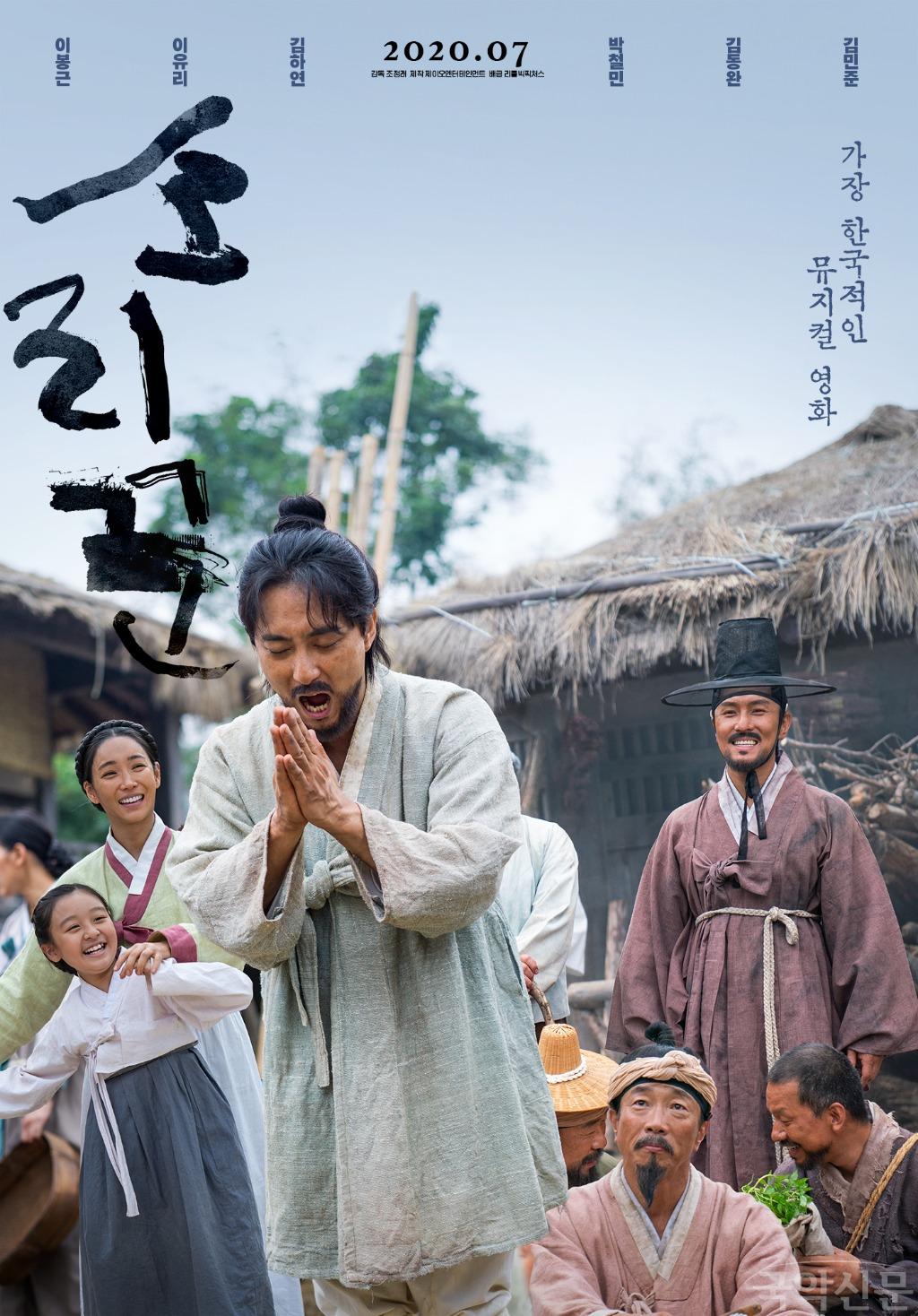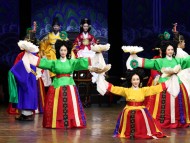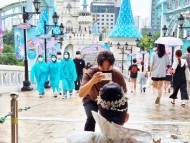2024.05.10 (금)
[Movie Release] “The Singer”. The sound changes the world.
The story of a pansori singer that made the world laugh and cry.
Hak-gyu's voice that changed the world.
- Dinara Shosaido…
- 등록 2020.07.24 10:41
- 조회수 977

"The Singer” (Korean name "Sorikkun”) directed Cho Jung-rae is the new musical movie showing the genre of pansori from a new perspective. It premiered on July, 1 2020.
It is a big screen debut of the professional Korean pansori performer from Namwon, Lee Bong-geun.
Tragic beauty of pansori.
Pansori is a genre of traditional Korean musical storytelling, performed by the singer, sorikkun, and the drummer. Pansori performance requires expressive singing, mastering various voice techniques, memorizing vast lyrics and artistic talent.
Pansori comprises both cultures of the noble class and the culture of common people. Male or female pansori singers improvise to the drummer's rhythm, performing up to eight hours, mixing poetry and academic expressions of the Yangbang, the noble class, and motives from the daily life of ordinary people. UNESCO inscribed pansori on the list of the Representative List of the Intangible Cultural Heritage of Humanity in 2003, becoming the first Korean classical genre on the list. For those interested in pansori and Korean folklore, we could recommend watching two older award-winning
Korean movies about pansori and sorikkun - "Seopyeonje” and Chunhyang”. Released in 1993, "Seopyeonje” became the first Korean movie to attract more than 10 million viewers. Cho Jung-rae says that he wrote the script of "The Singer” as his thesis in 1998, being inspired by "Seopyeongje”. The artist seems to be inspired by the blind pansori performer, a character named Songhwa. In this film, the director shows the real pansori singer's pain.
"The Singer.” The voice of the suppressed.
10th year of rule of King Yeongjo. The pansori singer Hak-gyu lives piecefully with his wife Gan-nan, who is a needlewoman for a noble class, and his daughter Cheongi. At the time, corrupt ruler of that place kidnapped and trafficked innocent people. While the husband was away, the wife and the child were kidnapped. The girl managed to escape thanks to her step-mother, but due to an accident in the woods went blind. The anger, sadness and unhappiness of this tragic situation were expressed through pansori.
On the journey to find his missing wife Gan-nan, sorikkun Hak-gyu was accompanied by his only helper, a drum accompanist Mr.Do (Kim Kang-hyun), their neighbor 'Daebong' (Park Cheol-min), "The Fallen Nobleman” (Kim Dong-wan). They created a singing band, wandering around Chosun Faldo and performing in front of the crowd.
Unlike Western operas, during sorikkun's performance, there is only one voice representing all the characters.
One moment you see him as Sim-cheong, and the next one he becomes Sim-bongsa.
He starts performing as Chunhyang, then sings on behalf of Chunhyang's mother, resisting the tyranny of the officials, and then again switches to the crying and grieving main character Chunhyang, waiting for her Lee Do-Ryeong. Screaming and sighing.
Pansori, reverberating in the hearts of people, who gathered at the market, and making them smile, instilled in them a fire of resistance against social contradictions. Violently criticizing self-contradictions of the noble class through cheerful satire, pansori became eyes, ears and voice of the people of the world. Pansori fervently expressed what people wanted to say.
Gradually, the tragic beauty gained national reputation as having a healing power to those who were hurt. Little by little, it opens the eyes of the people. Finally, people saw the world through the power of songs. Songs of the little music band changed the world step by step.
"Simcheong-ga”, suggesting the devastated population of Chosun, that good should be encouraged and evil should be punished.
Along the way Hak-gyu creates one of the most famous of the five surviving pansori tales, "Simcheong-ga.” It is the story about the girl Sim-cheong who sacrificed herself to the king of the underwater to cure her father’s blindness. Sadly, Hak-gyu’s young daughter went blind, but they discovered that she had a beautiful voice and gave an amazing pansori
performance. The topic of sorikkun’s blindness is present in different pansori tales, since it is believed that deprived of the sense of sight, people’s other senses and talents develop sharper.
In the end, Hak-gyu rescued his wife and healed his daughter’s blindness. It is a beautiful movie about the power of one’s will and the power of pansori.
The highlight of the musical movie – music itself.
The movie has a great selection of folk musical pieces arranged a beautiful ways – from traditional pure pansori to a modern take on Korean folk music. Some scenes feel almost like the scenes from famous musicals.
In order to diversify the audienceLee Bong-geun trying out and implementing the "crossover” method in his performance of the Korean traditional music. Various genres, including popular music were intricated into the flow of the traditional music. He also studied jazz scat (random vocal improvisations to jazz music), releasing variations of jazz music mixed with Korean traditional music. The singer said, that appearance on the big screen opens new horizons for Korean traditional music.
This piece of art could be an opportunity to spread the word about Namwon, the hometown of pansori and to take a closer look at pansori, the intangible cultural heritage of humanity.
- [] 제6회 울진금강송 전국국악경연대회(06/08)
- [] 제29회 대통령상 한밭국악전국대회(07/06-07) (무용/기악/성악)
- [] 제8회 목담 최승희 전국국악경연대회(06/01) (판소리,기악)
- [] [서울]제28회 전국판소리경연대회(06/15-16)
- [] 제32회 대전전국국악경연대회(06/01-02)
- [] 제16회 순천 낙안읍성 전국가야금병창경연대회(05/25-26)
- [] 제18회증평국악경연대회(05/11)
- [] [군산]제32회 전국청소년민속예술경연대회(05/18)
- [] 제42회 전주대사습놀이 학생전국대회(5/18∼6/2)
- [] 제50회 전주대사습놀이 전국대회(5/18~6/3)
- [] 제20회 전국대금경연대회(06/08-09)
- [] 제4회 함양 전국국악경연대회(05/12)
- [] 제18회 대한민국 전통예술무용·연희대제전(06/09)<br>무용(전통무용…
- [] 제48회 부산동래 전국전통예술경연대회(06/15-16)(무용.기악)
- [] [부여]제1회충남전국청소년국악경연대회(05/04)(판소리.기악.타악)
- [] [광주]제21회 대한민국 가야금병창대제전(06/16)
- [] 제18회 과천전국경기소리경창대회(05/04)
- 제11회 곡성 통일전국종합예술대전(06/15-16)(판소리.무용, 기악,…
- [] 제24회 인천국악대제전 전국국악경연대회(05/25-26)
- [] 제26회 창원야철전국국악대전(07/06- 07)
- [] 2024 무안장애인 승달국악대제전(06/01-02)
- [] 제22회 무안전국승달국악대제전(06/01-02)
- [] 제10회 전국공주아리랑민요경창대회(05/26)
- [] 제17회 상주전국국악경연대회(05/19)(성악/무용·연희/기악)
- [] 제10회 전국밀양아리랑경창대회(05/26)
- [] 제21회 강남전국국악경연대회(05/22)(무용/타악/판소리/민요)
- [] 제26회 서편제보성소리축제 전국판소리 고수 경연대회(05/04-05)
- [] [순천]제10회 낙안읍성 전국 국악대전(04/27-28)
- [] 제29회 안산전국청소년국악경연대회(05/26)
- [] 제26회(통합58회) 여수진남전국국악경연대회(05/18-19)
- [] 제51회 대한민국 춘향국악대전 경연대회(05/05)(05/11-12)
- [] 제33회 고령전국우륵가야금경연대회(04/26-27)
- [] [부평]제8회 전국 청소년국악경연대회(05/11)(관악/현악/성악)
- [] 제22회 구례전국가야금경연대회(05/04-05)
- [완도]제24회 장보고국악대전 전국경연대회(05/05-06)(무용/판소리…
- [] 제23회 대한민국 빛고을 기악대제전(05/25-26)
- [] [인천] 제10회 계양산국악제(04/26-27) (풍물,사물, 기악,민요…
-

[수요연재] 이무성 화백의 춤새(90)<br> 춤꾼 송영은의 '강선영류 태평무' 춤사…
태평무 국가무형유산 '태평무'는 강선영(1925-2016)선생에 의해 전해지면서 격조있는 무대예술로 발전 되었다. 태평무는 나라의 풍년과 태평성대를 축원하는 뜻을 지니...
-

[수요연재] 한글서예로 읽는 우리음악 사설(192)<br>강원도아리랑
강원도 아리랑을 쓰다. 한얼(2024, 선면에 먹, 53× 26cm) 봄바람 불어서 꽃 피건마는 고닯은 이 신세 봄 오나마나 ...
-

[화요연재] 박상진의 한류 이야기 81 <br> ‘국악의 날’ 지정을 위한 제언(8)…
최근 BTS를 배출한 하이브와 뉴진스를 배출한 어도어의 민희진 대표와의 갈등에 대한 소식이 연일 연예 문화 뉴스를 장식하고 있다. 이러한 갈등 속에 하이브의 주가가 약 1조원 가까...
-

[월요연재] 이윤선의 남도문화 기행(144)<br>거문도 인어 '신지끼' 신격의 계보…
거문도의 인어 신지끼 "안개 있는 날에 백도와 무인도 서도마을 벼랑에서 주로 출몰 바위에 앉아 있거나 헤엄치기도 벼랑위에서 돌 던지기도 한다 해난사고나 바다에서 위험 경고...
-

[PICK인터뷰] 원장현 명인, “산조는 우리 삶의 소리”
[국악신문 정수현 전문기자]=국립국악원 창작악단은 오는 5월 9일과 10일 국립국악원 예악당에서 이태백류 아쟁산조와 원장현류 대금산조 전바탕 '긴산조 협주곡'을 초연한다. 아쟁과 ...
-

[Pick리뷰] 경성 모던걸들의 춤판 '모던정동'…"자유 갈망하는 모습 담아"
30일 서울 중구 국립정동극장에서 열린 국립정동극장예술단 정기공연 '모던정동' 프레스콜에서 출연진이 주요 장면을 시연하고 있다. 2024.4.30 ...
-

세실풍류, 박병천의 '구음시나위'에 허튼춤 선사한 안덕기
국립정동극장이 4월 한달간 진행하는 '세실풍류 : 법고창신, 근현대춤 100년의 여정'에서 23일 박병천의 '구음시나위'에 허튼춤 추는 안덕기 (사진=국립정...
-

세실풍류, 동해별신굿 민속춤사위를 제해석한 조재혁의 '현~'
국립정동극장이 4월 한달간 진행하는 '세실풍류 : 법고창신, 근현대춤 100년의 여정' 에서 조재혁의 '현~' 공연 모습. (사진=국립정동극장). 2024....
-

[Pick리뷰] 이호연의 경기소리 숨, ‘절창 정선아리랑!’
# ‘이호연의 경기소리 숨’ 공연이 지난 4월 26일 삼성동 민속극장 ‘풍류’에서 열렸다. 20대에서 60대까지의 제자들 20명과 5명의 반주자와 함께 경기잡가, 경기민요, 강원도...
-

[PICK인터뷰] 미리 만나 보는 '제94회 남원춘향대전'
[국악신문 정수현 전문기자]=대한민국에서 가장 오래된 축제로 손꼽히는 남원춘향대전(남원춘향제)이 오는 5월 10일(금)부터 5월 16일(목)까지 7일간 남원시 광한루원 일대에서 열...
-

[Pick리뷰] 모던연희극 ‘新칠우쟁론기’
4월 18일부터 20일, 남산국악당에서 아트플랫폼 동화의 모던연희극 ‘新칠우쟁론기’가 펼쳐졌다. [국악신문 정수현 전문기자]=지...
-

[PICK인터뷰] 국립국악관현악단의 채치성 예술감독을 만나다
[국악신문 정수현 전문기자]=봄비가 촉촉이 땅을 적시는 4월, 국립국악관현악단 예술감독으로 취임한 지 6개월이 된 채치성 예술감독님을 만났다. 그는 국악방송 사장, KBS 국악관현...
-

[Pick리뷰] 이 시대의 새로운 춘향가- ‘틂:Lost&Found’
2024 쿼드초이스_틂 (사진=서울문화재단 대학로극장 쿼드 나승열) [국악신문 정수현 전문기자]=대학로극장 쿼드의 ‘쿼드초이스’...
-

[Pick리뷰] 세 악단의 조화로운 하모니, ‘하나 되어’
지난 4일, 국립국악원은 국립국악원 창작악단, KBS국악관현악단, 전북특별자치도립국악원 관현악단 118명으로 구성된 연합 관현악단 무대 ‘하나되어’를 국...






























